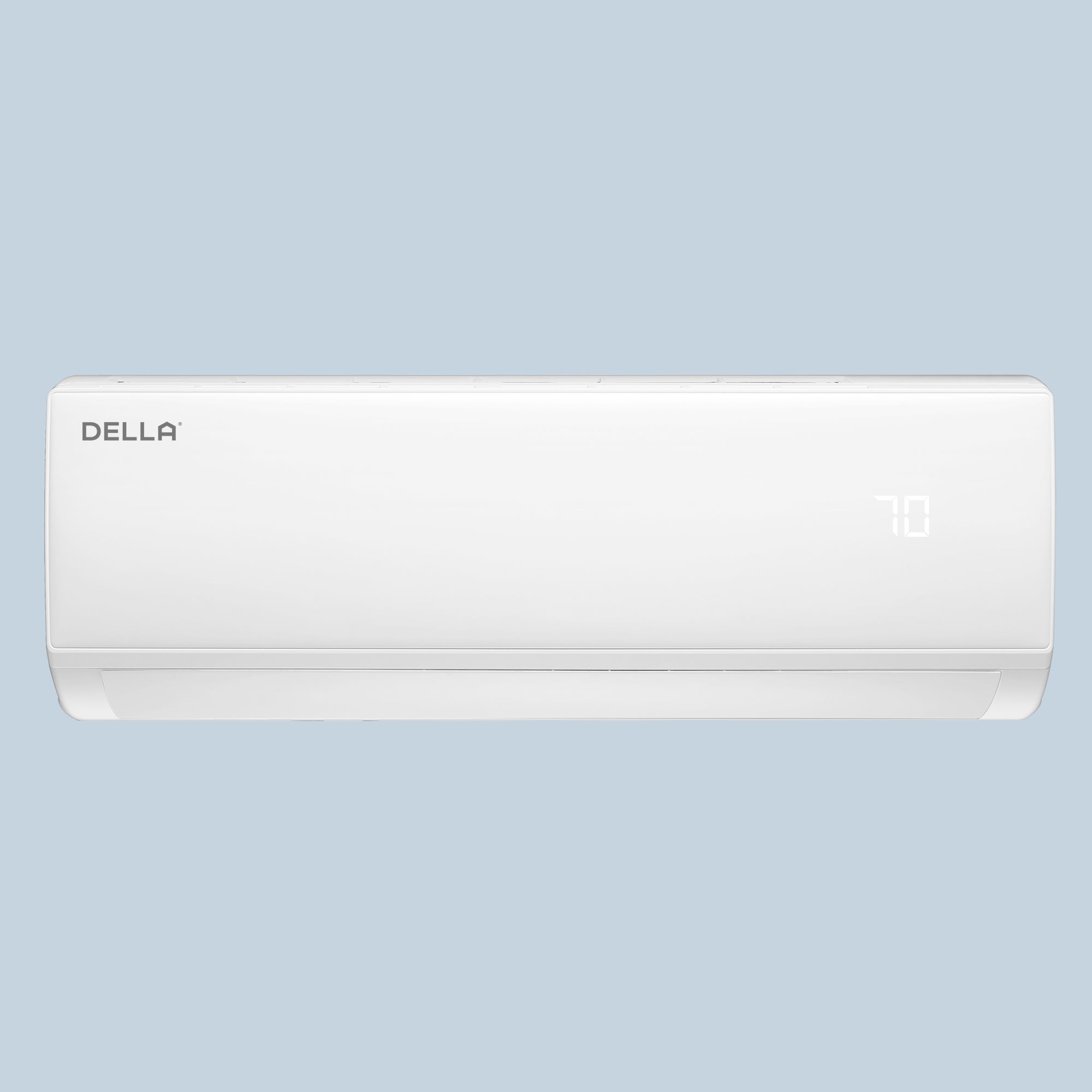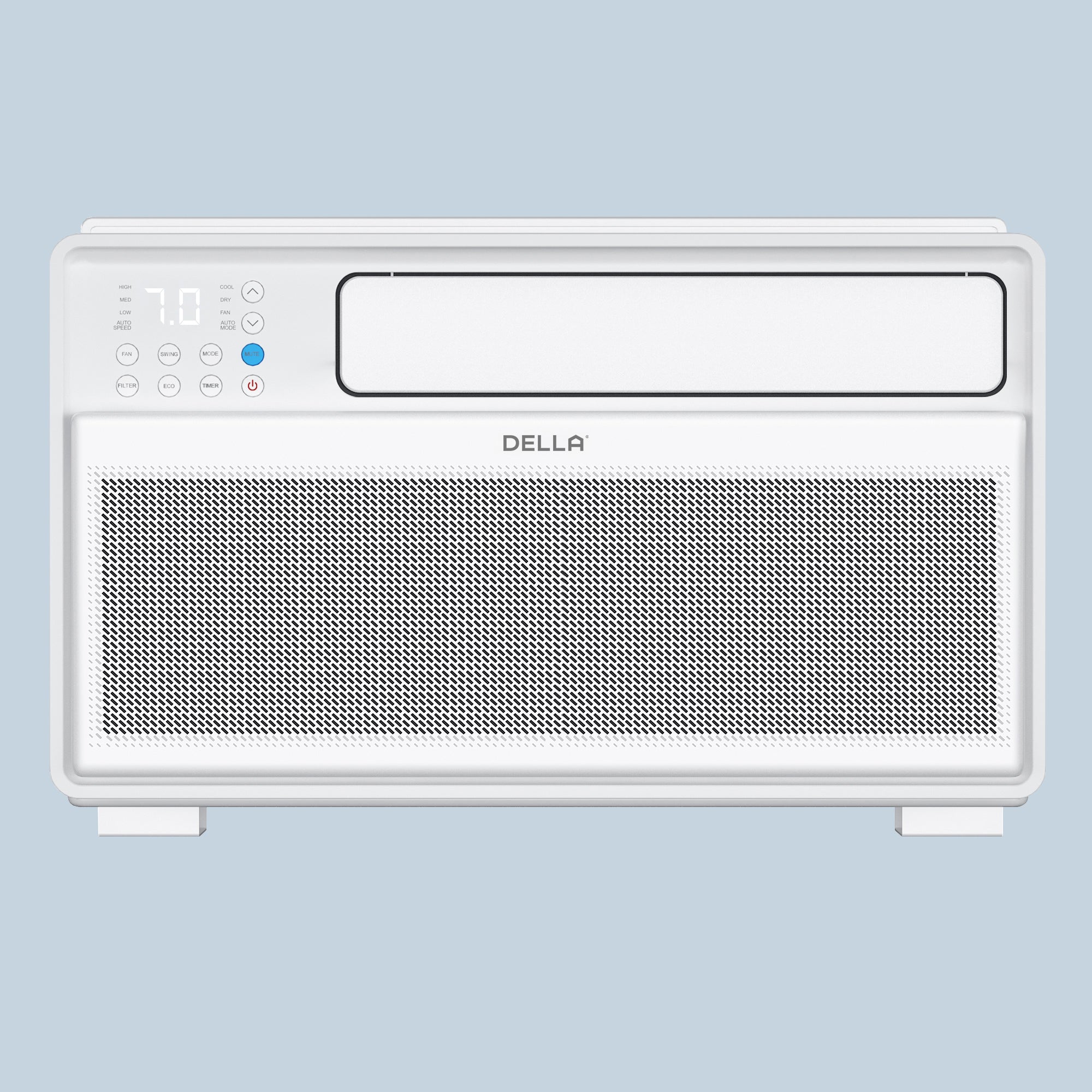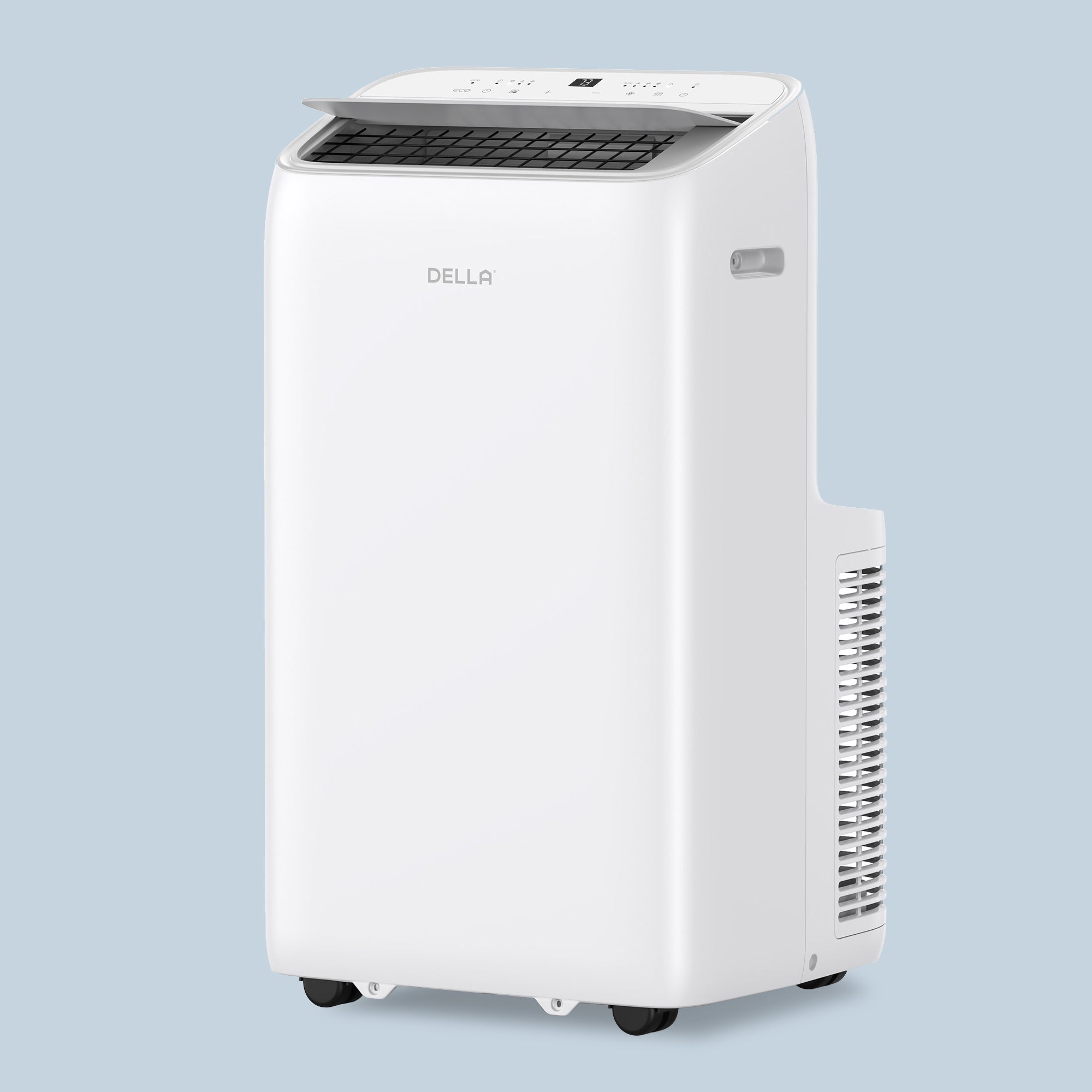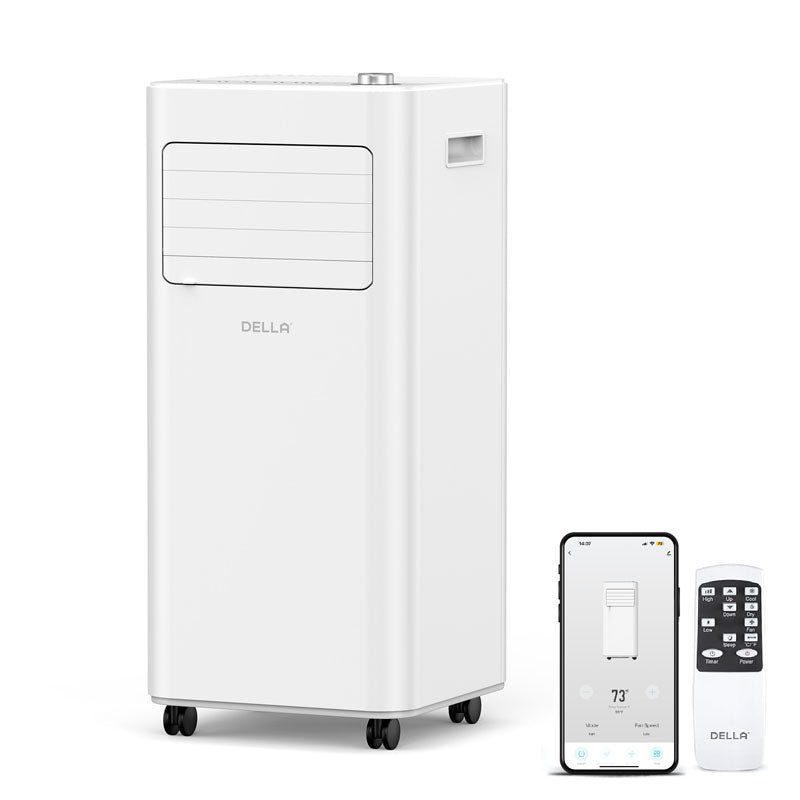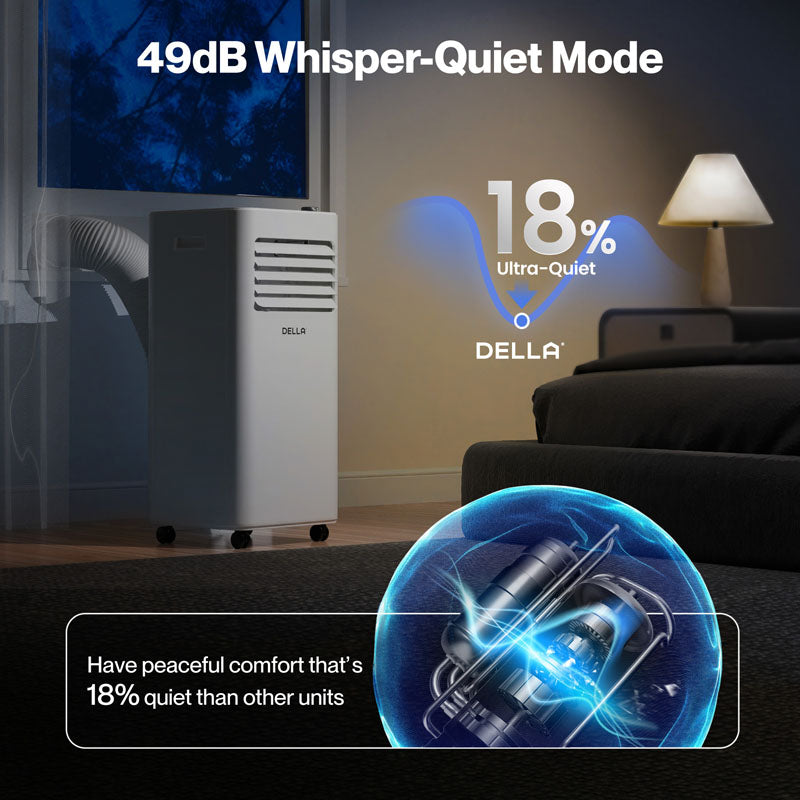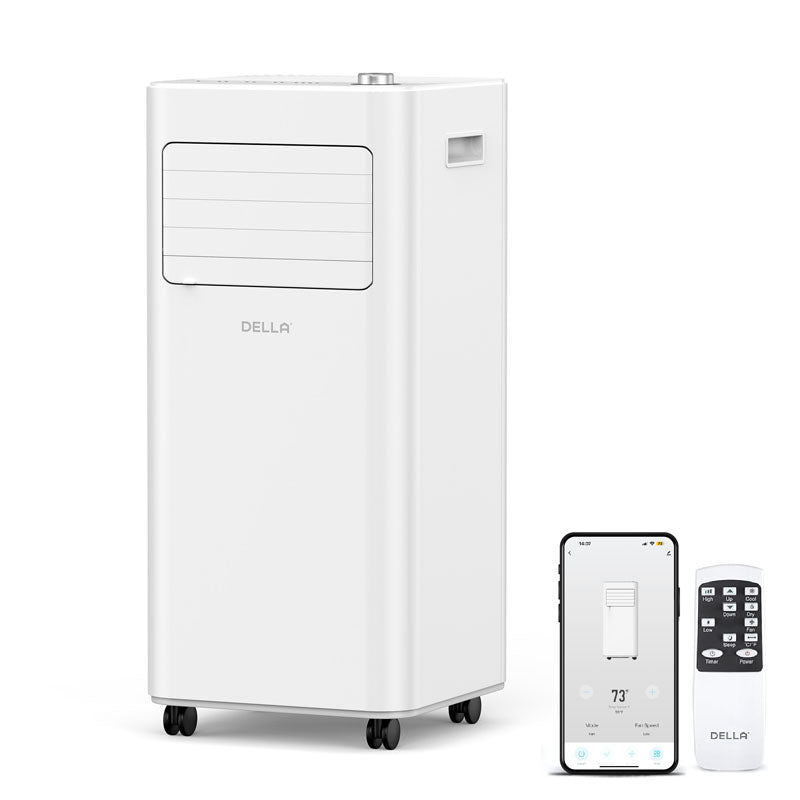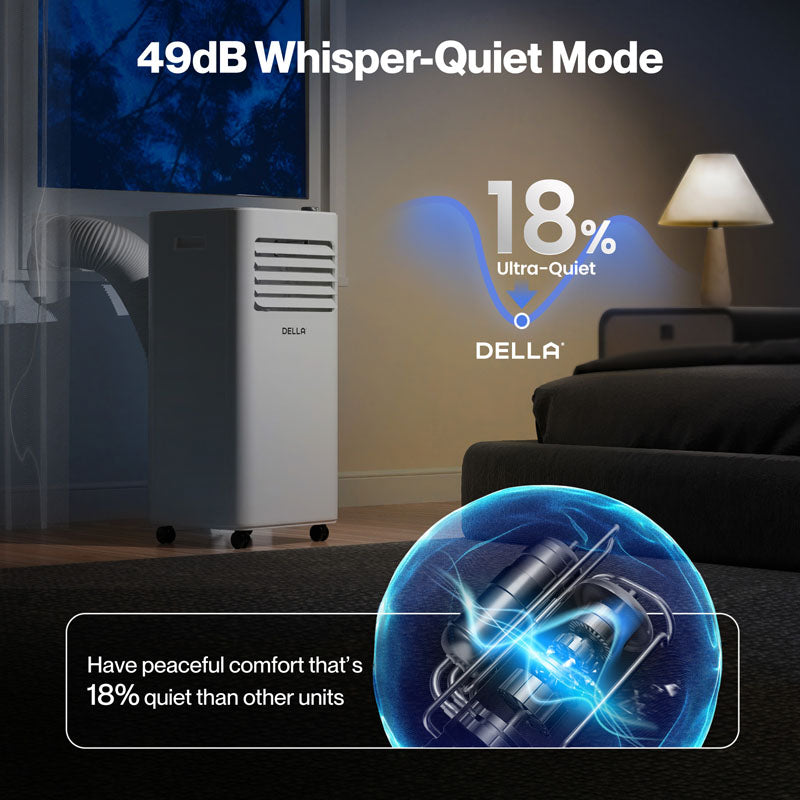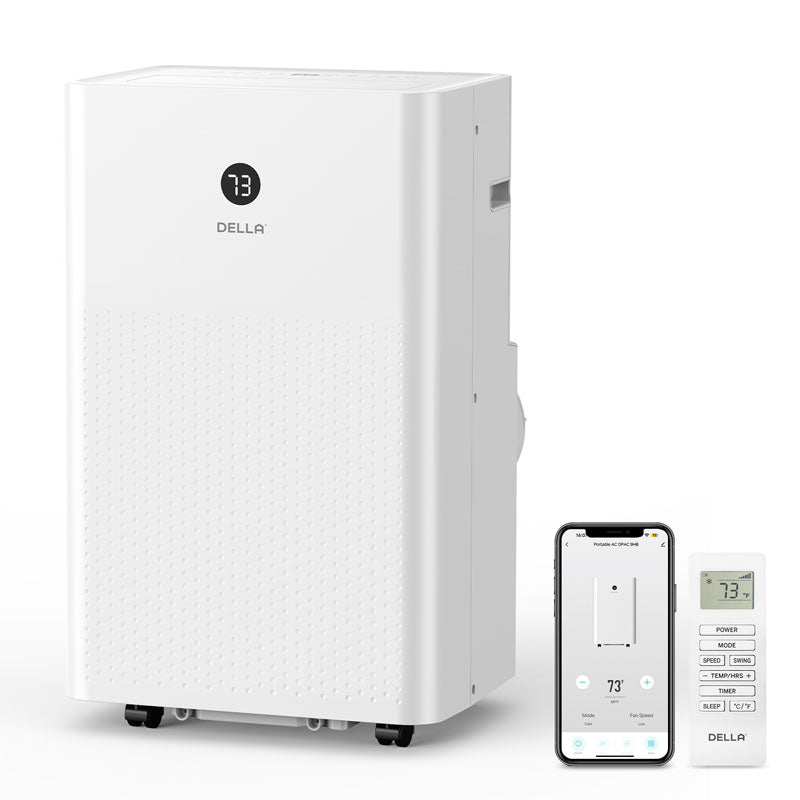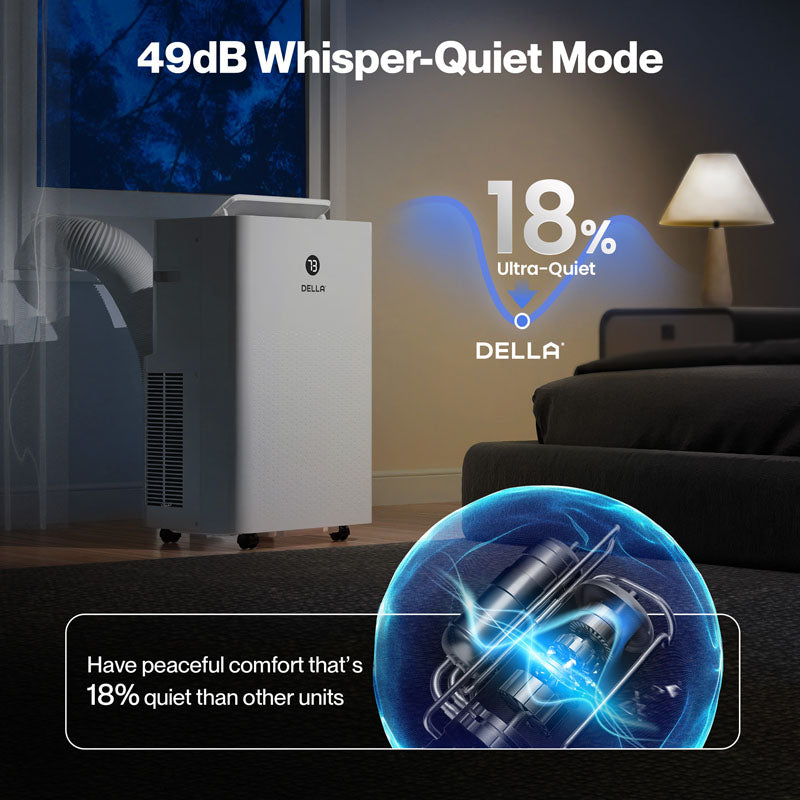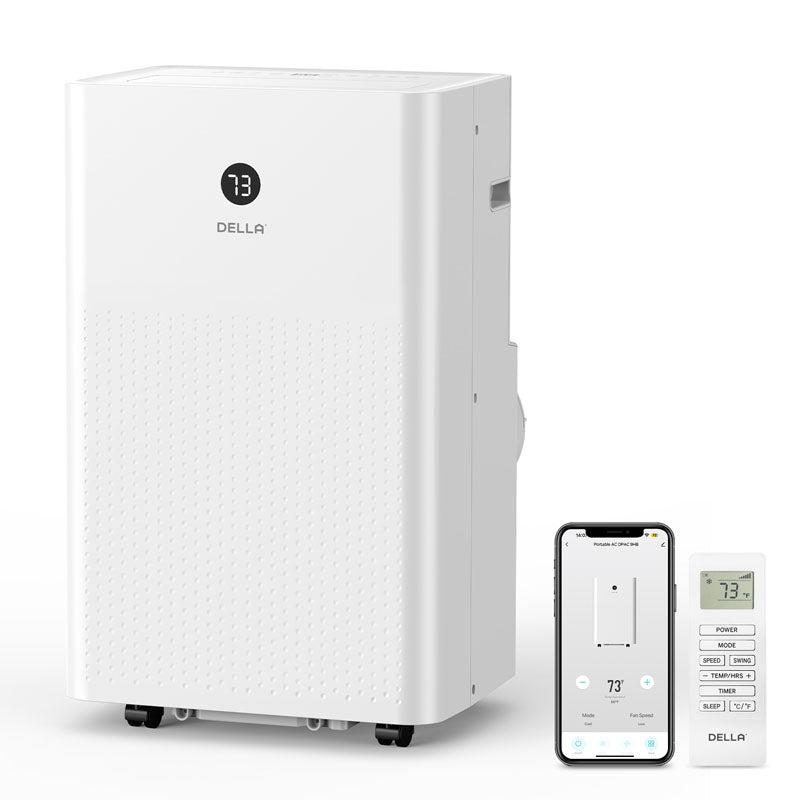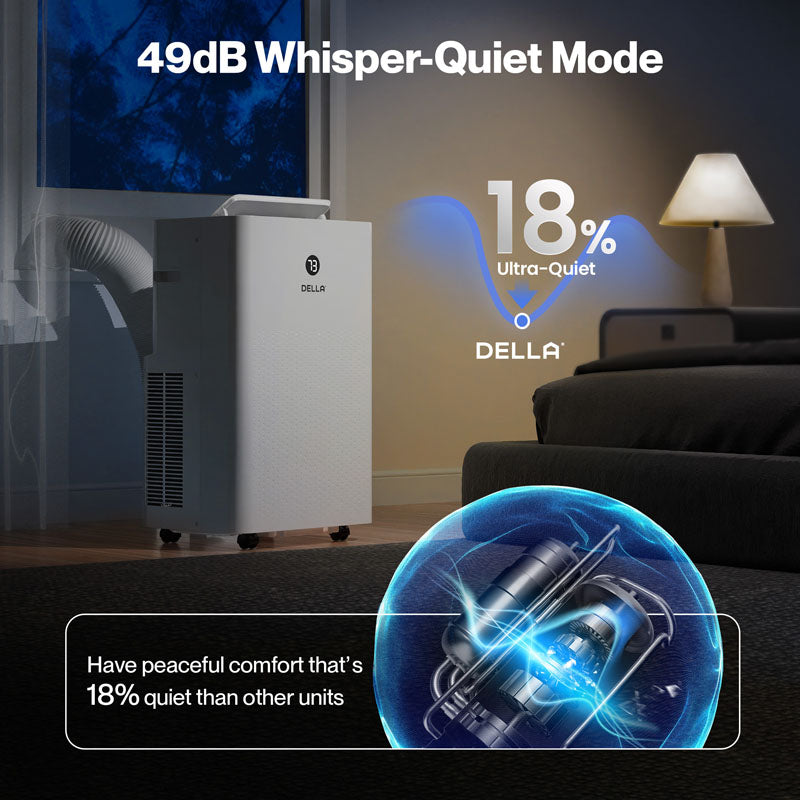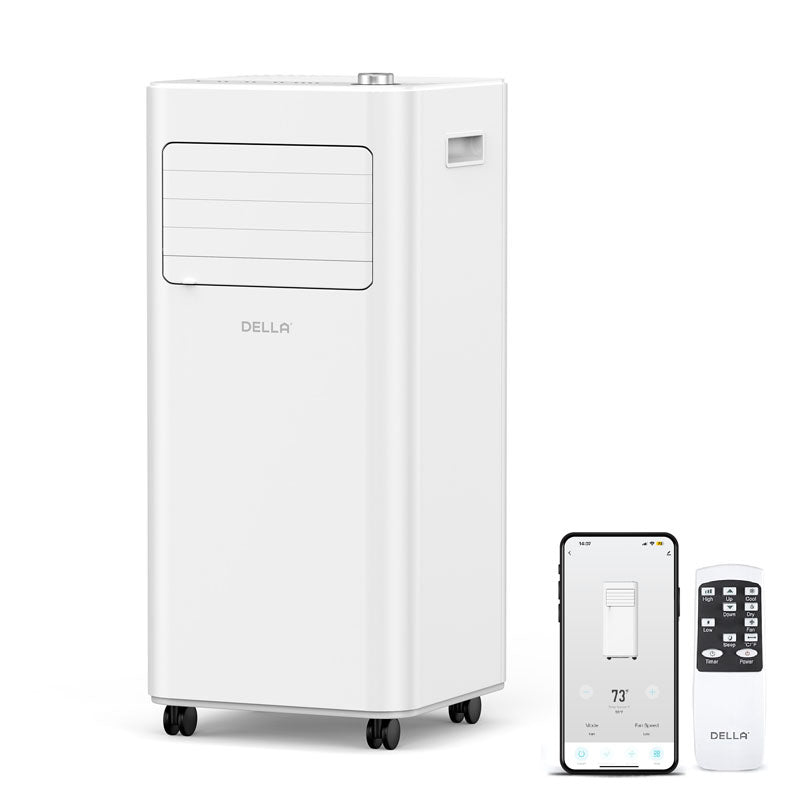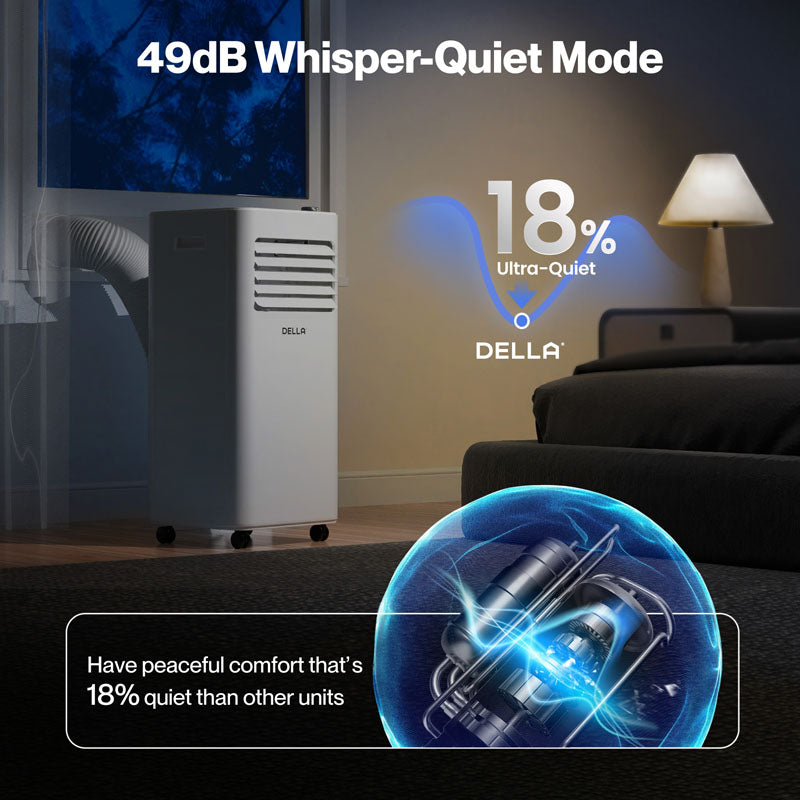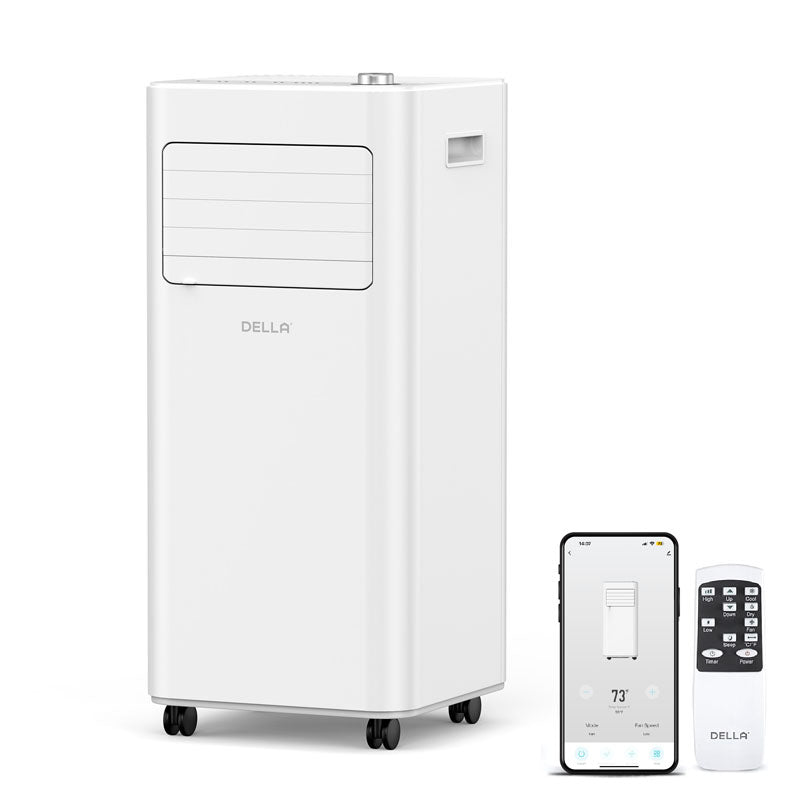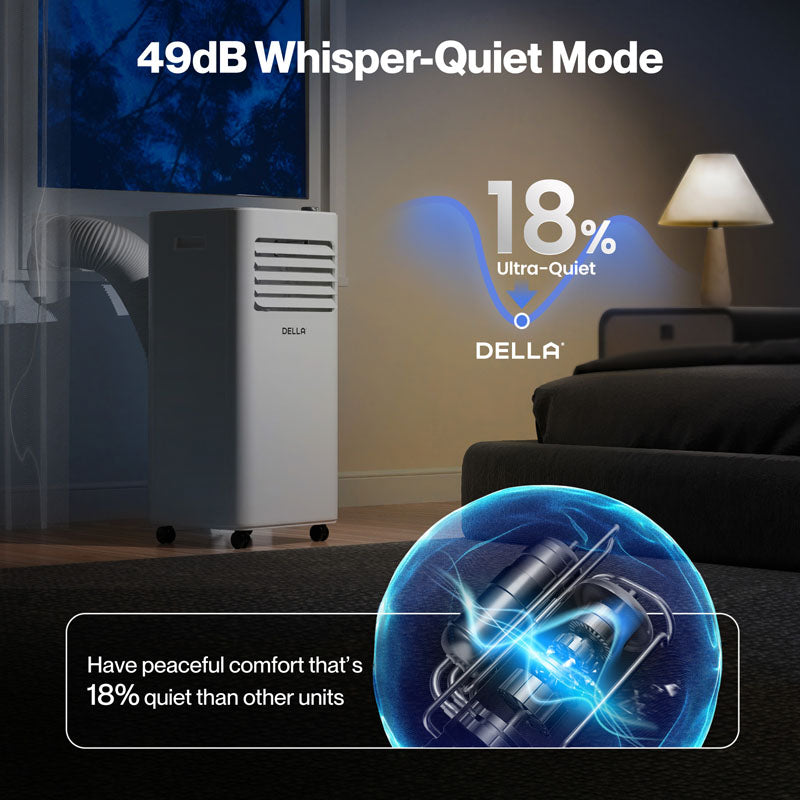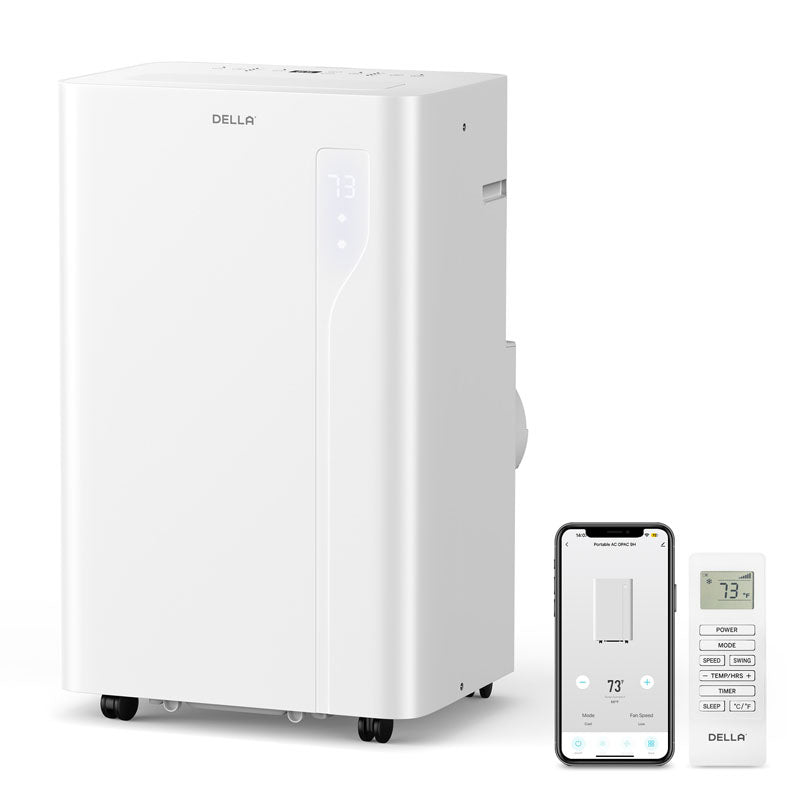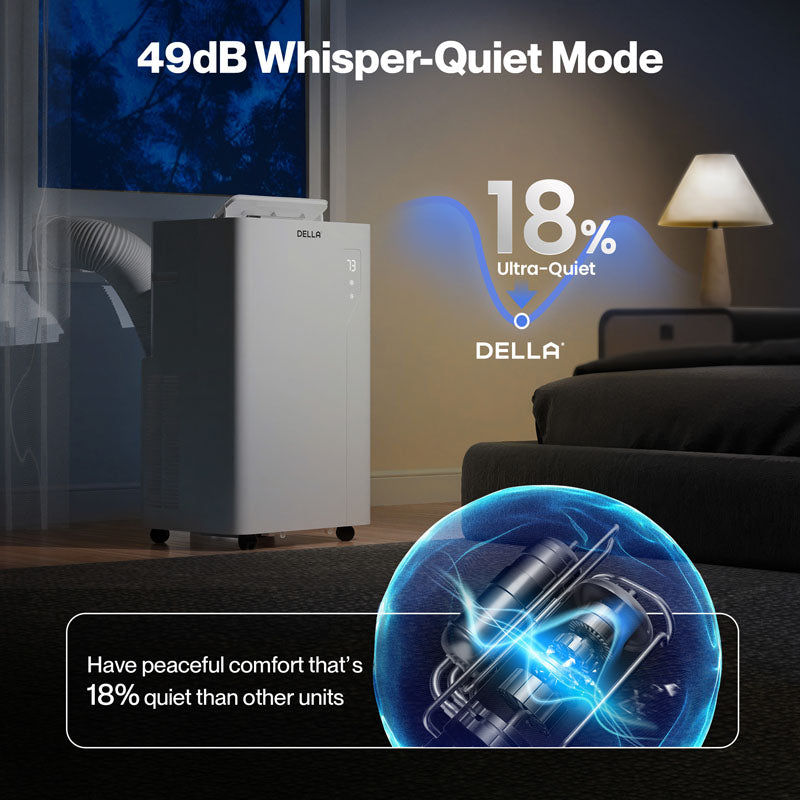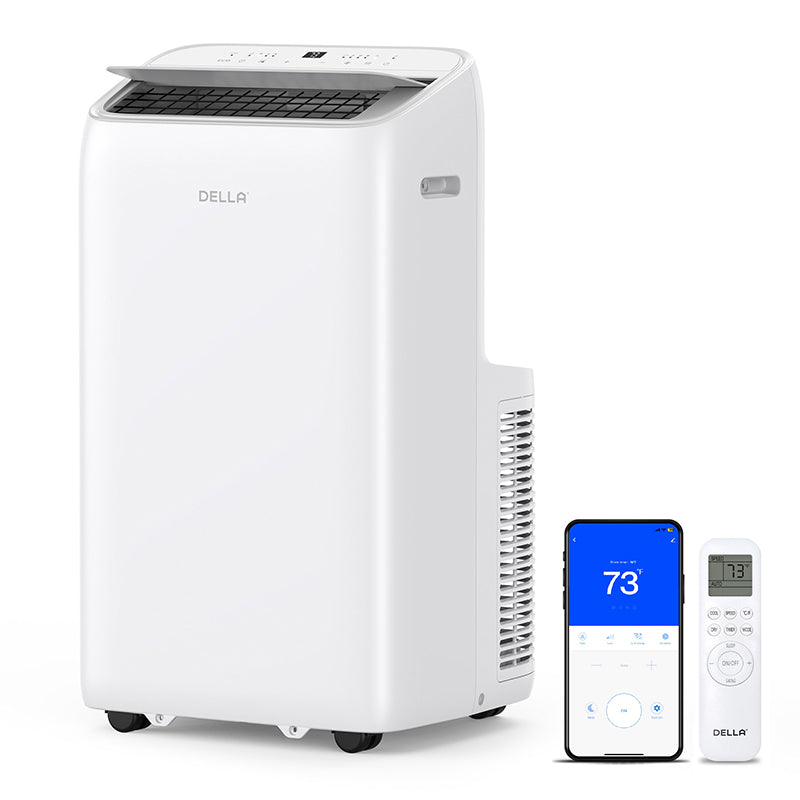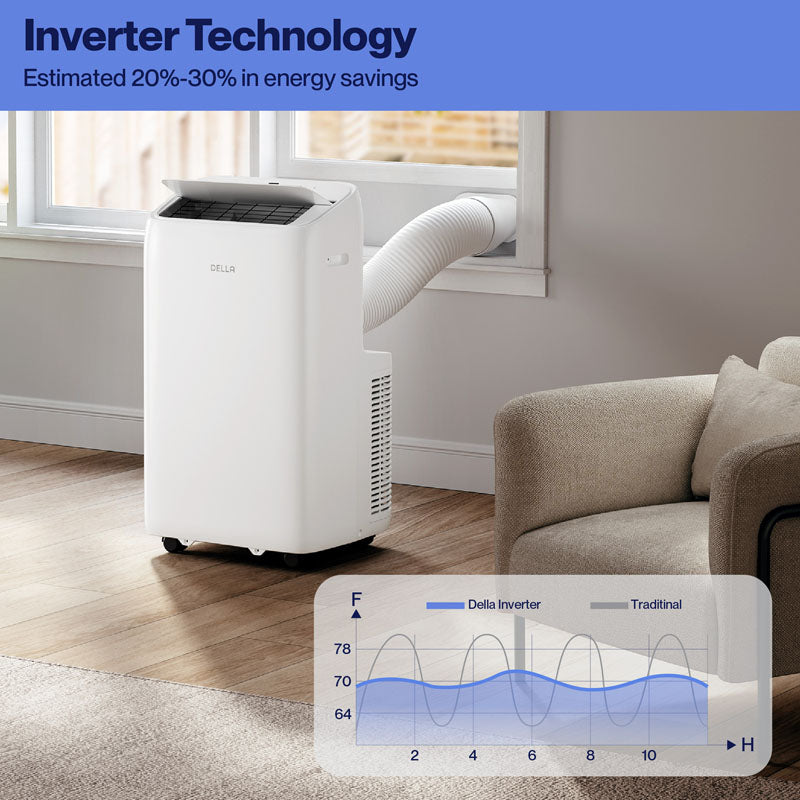FAQs
1. What's the difference between Della's Portable Air Conditioners Models?
Della offers three portable air conditioner models: Traverse, Velocity, and Inverter. Here's a comparison to help you choose the right one for your needs:
Traverse Series
The Traverse Series is Della's entry-level portable air conditioner, offering essential cooling and heating functions suitable for small to medium-sized rooms. It features a user-friendly digital LED display, three fan speeds, and a 24-hour timer for energy savings. This model is ideal for those seeking a straightforward, cost-effective solution for climate control.
Velocity Series
The Velocity Series serves as Della's mid-range option, providing enhanced cooling and heating capacities for larger spaces. It includes additional features such as Wi-Fi connectivity, allowing control via a smartphone app or voice assistants like Alexa. This model is perfect for users desiring more advanced functionality and remote operation capabilities.
Inverter Series
The Inverter Series represents Della's high-end portable air conditioners, equipped with inverter technology for superior energy efficiency and ultra-quiet operation. It offers powerful 3-in-1 functions, including cooling, dehumidifying, and fan modes, along with smart controls via Wi-Fi and compatibility with Alexa. This model is ideal for those prioritizing energy savings, quiet performance, and advanced smart features.
2. What's the pros and cons of portable AC?
Pros of Portable AC:
- Flexibility: Portable air conditioners are easy to move between rooms, providing cooling wherever needed.
- Easy Installation: AC unit portable options offer simple setup without permanent installation and fit most window types.
- Compact Design: A small portable air conditioner saves space and is suitable for tight or limited areas.
- Multi-functionality: Many portable ac units include cooling, dehumidifying, and fan modes for versatile use.
- Affordable: Generally, a portable air conditioner model is cheaper than central air conditioning systems.
- Temporary Cooling Solution: Perfect for renters or short-term cooling needs thanks to the mobility of portable air conditioners.
Cons of Portable AC:
- Lower Efficiency: Consumes more energy compared to window or small window ac units, or mini split air conditioning for the same cooling capacity.
- Limited Cooling Power: Best for small to medium-sized rooms; struggles with larger spaces.
- Noisy Operation: Can be louder than other AC types since the compressor is inside the room.
- Requires Venting: Needs a hose to vent hot air, usually through a window, which can limit placement.
- Space Requirement: Takes up floor space and may be less visually appealing.
- Maintenance: Requires regular emptying of the water tank (if not self-evaporating) and filter cleaning.
3. Is it okay to run a portable AC unit 24/7?
Yes, it is okay to run a portable air conditioner 24/7, as they are designed to run continuously. And here are some important considerations for efficiency and safety:
- Proper Maintenance: Clean the air filters regularly and check for any blockages in the exhaust hose to maintain efficiency and prevent overheating.
- Energy Costs: Running an ac unit portable continuously can significantly increase electricity bills. Use energy-saving features like programmable timers or thermostats to reduce costs.
- Longevity: Continuous operation may shorten the unit's lifespan. Allowing the unit to rest periodically can reduce wear and tear on components like the compressor.
- Ventilation: Ensure the exhaust hose is properly vented outside to prevent heat and moisture buildup in the room.
- Safety: Make sure the unit is plugged into a properly grounded outlet and avoid overloading the circuit. Inspect the power cord for any damage.
- Room Conditions: For efficient cooling, ensure the room is well-insulated and that doors and windows are sealed to minimize heat infiltration.
This advice applies to portable air conditioners of all sizes, from small portable air conditioner units for bedrooms to larger portable ac units for living spaces.
4. Does aportable AC use a lot of electricity?
No, a small portable air conditionerdoes not necessarily use a lot of electricity, as it is designed to cool specific spaces rather than entire homes. Additionally, modern portable air conditioners often include features like inverters and programmable thermostats that reduce energy consumption.
Let's take Della 14000 BTU Portable AC SEER 7.83 as an example. Here's the cost calculation:
- Rated Power: 1200 W (1.2 kW)
- Electricity Rate: $0.15 per kWh (average U.S. rate)
- Usage: Assume 8 hours of daily use.
Daily Cost Calculation:
- Energy Use Per Day = 1.2 kW × 8 hours = 9.6 kWh
- Daily Cost = 9.6 kWh × 0.15 $/kWh = 1.44 $/day
- Monthly Cost = $1.44/day × 30 days = $43.20/month
5. What maintenance does a mobile home ac unit need?
Proper maintenance of a portable air conditioner is essential to ensure efficient performance, extend its lifespan, and maintain air quality. Here’s what you need to do:
Regular Cleaning of the Unit
- Use a soft, dry cloth or a damp cloth with neutral detergent to clean the exterior of the unit.
- Do not flush the unit with water or use volatile cleaning agents like thinner or alcohol, as these can damage the AC.
- Perform this cleaning every few weeks or whenever you notice dust or dirt accumulation on the surface.
Cleaning the Air Filter
The air filter should be cleaned every two weeks or more often if you use the AC frequently or in a dusty environment.
Steps to clean the filter:
- Remove the air filter from the unit.
- Use a vacuum cleaner to remove dust, or wash the filter with warm water and mild neutral detergent.
- Let the filter dry completely before reinserting it into the AC.
Keeping the filter clean improves airflow and cooling efficiency while reducing energy consumption.
Emptying or Checking the Water Tank
Some portable ac units collect moisture in a water tank. Check the tank daily or as needed, especially in humid conditions.
- Empty the tank and ensure it is dry to prevent mold or mildew growth.
- If the unit has a self-evaporation feature, check for proper drainage to avoid leaks.
Inspecting the Exhaust Hose
Inspect the exhaust hose monthly for any kinks, blockages, or leaks, as these can reduce efficiency and cause overheating. Ensure the hose is properly connected and vented to the outside.Seasonal Maintenance
At the end of the cooling season:
- Clean the entire unit, including the air filter and exterior.
- Store the unit in a dry, dust-free area to protect it from damage during the off-season.
Whether you're using a small portable air conditioner in a bedroom or a larger ac unit portable in your living space, proper care ensures your portable air conditioners perform reliably when you need them most.
6. What size small portable AC do I need for my apartment?
To determine the size of a small portable air conditioner for your apartment, consider the cooling capacity measured in BTUs (British Thermal Units).
Portable air conditioners typically range from 8,000 to 14,000 BTUs. Use the following guideline:
- 8,000 BTUs: Rooms up to 200 square feet.
- 10,000 BTUs: Rooms up to 300 square feet.
- 12,000 BTUs: Rooms up to 400 square feet.
- 14,000 BTUs: Rooms up to 500 square feet or larger.
In addition, to know the exact required BTU rating depends on the size of the space and other factors:
- Apartment Layout: If your apartment has an open floor plan, consider a higher BTU rating to cool the combined area effectively. For compact studio apartments under 300 sq ft, an air conditioner for small room paired with strategic airflow management often provides sufficient coverage.
- Ceiling Height: If your ceilings are higher than 8 feet, you may need additional BTUs to compensate for the extra volume.
- Sunlight Exposure: Increase the BTU rating by 10% for spaces with significant direct sunlight. For example, a shaded 400 sq ft room might need a 12,000 BTU air conditioner, while sunlit spaces may require 14,000 BTUs.
- Insulation: Poorly insulated apartments require more cooling power to maintain a comfortable temperature.
- Occupants and Electronics: Add 600 BTUs per additional occupant or for rooms with heat-producing electronics or appliances.
7. What is the life expectancy of a standing AC unit?
The life expectancy of an ac unit portable is typically 5 to 10 years with proper use and maintenance.
Factors Affecting Lifespan:
- Frequency of Use: Continuous or year-round operation can shorten the lifespan.
- Maintenance: Neglecting filter cleaning, coil maintenance, and proper storage can lead to premature wear.
- Operating Environment: Dusty, humid, or poorly ventilated conditions can strain the portable air conditioner.
- Proper Sizing: Using an undersized (e.g., 9000 BTU air conditioner for 500 sq ft) or oversized unit can overwork the system, reducing longevity.
Tips to Extend Lifespan:
- Clean air filters regularly (every 2–4 weeks during use).
- Keep the exhaust hose properly vented and unobstructed.
- Store the unit in a clean, dry place during off-seasons.
- Perform seasonal maintenance, including cleaning coils and checking for blockages.
- Avoid overloading the electrical circuit and use the portable air conditioner within its recommended capacity.
8. Can a mobile home ac unit cool a room?
Yes, a mobile home ac unit can effectively cool a room. For comparison, an 18,000 BTU air conditioner can handle spaces up to 800 sq ft with proper insulation. The Della 8000 BTU small portable air conditioner is designed to cool rooms up to 350 square feet, making it suitable for bedrooms, offices, or small living areas.
9. Can a portable AC heater be a heater?
Yes, a portable AC heater, such as the Della 14000 BTU portable AC with heat pump, can function effectively as a heater. This model provides a heating capacity of 11,669 BTUs, making it suitable for warming rooms up to 550 square feet. For whole-home solutions, multi head mini split systems allow simultaneous temperature control in multiple zones.
This type of ac unit portable is a great option for those who need both cooling and heating in one device. Many portable ac units offer this dual functionality, and even a small portable air conditioner with a heat mode can be useful in compact spaces.
Free & Fast Shipping
Same Day Processing
30 days Money-back
Guarantee
24x7 Live Chat Support
M-F Technical Phone Support
Lifetime Coverage
(Mini Splits)
